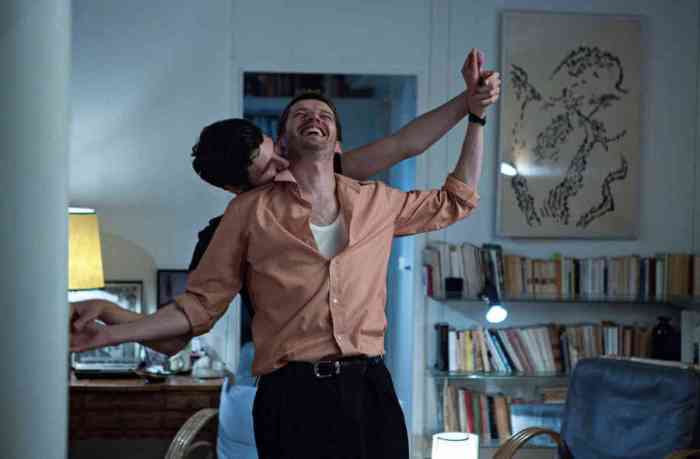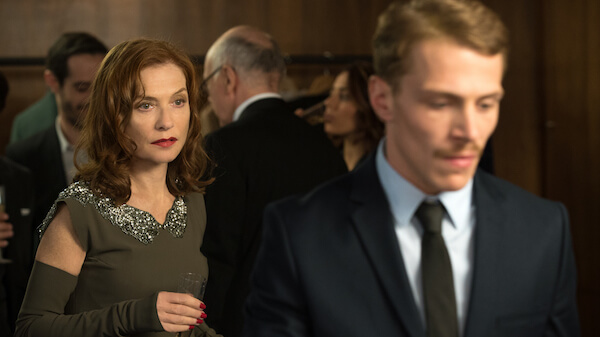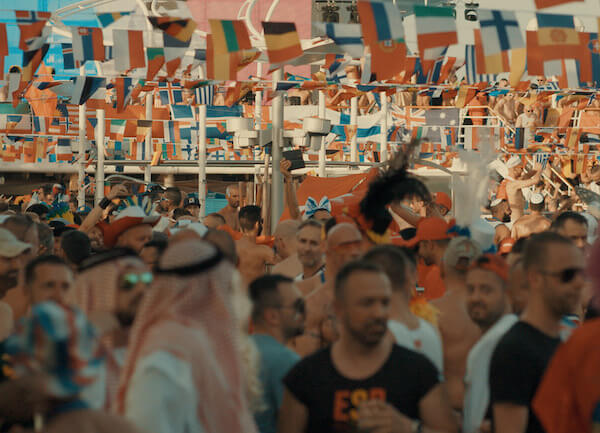Wagner Moura (center) in Karim Aïnouz’s “Futuro Beach.” | STRAND RELEASING
Out gay filmmaker Karim Aïnouz’s superb new film “Futuro Beach” is a gripping three-part drama that begins in dangerous ocean waters. Konrad (Clemens Schick) is swimming with his friend Heiko (Fred Lima) at a Brazilian beach when Heiko suddenly disappears. Donato (Wagner Moura), a hunky lifeguard, saves Konrad and explains that Heiko is the first swimmer he has ever lost.
Bound by their shared survivor’s guilt, Donato offers assistance to Konrad. These men are strangers to each other and the audience, Aïnouz providing no background except a few lines of dialogue. But their bond is strong; almost immediately the two guys are having a hot and heavy tryst in Donato’s car. As they spend increasingly more time together during the 10 days Konrad searches for his friend’s missing body, their relationship deepens. In fragmented episodes, Aïnouz captures the ebb and flow of their erotic and emotional currents.
Deep, often unspoken forces drive bodies to their destiny in Karim Aïnouz’s “Futuro Beach.”
“Futuro Beach” has no real plot. It is a mood piece featuring bodies in various dramatic environments — cities, beaches, in the water, and on the road. Konrad’s search for the missing Heiko is a quietly powerful sequence in a boat along the ocean. Donato is most at home in a pool or working in an aquarium. The emphasis on the men’s physical — and often naked or near-naked — bodies is mesmerizing. They express themselves more with silence and body language than verbal communication.
One poignant scene has Konrad and Donato stripping down to their undershorts on craggy rocks. The men allow the water to splash up against them, and the danger provides them with a release for their emotions. This is also a rare moment when the two men verbally articulate their feelings for each other.
The intense affair between these sexy strangers does not end after Konrad returns to Germany. Part two of the film has Donato visiting Konrad, the men spending time dancing, fucking, and fighting. They also discuss the future of their relationship, which it appears could end at any moment. The despair each of these men exhibits makes their drama hypnotic.
Konrad continues to struggle with Heiko’s death in Brazil, while Donato seems uneasy away from a beach during his visit to Germany. The men’s feelings are largely unspoken, even repressed as they try to find comfort in each other.
“Futuro Beach” is all about displacement and how people adapt to being out of their natural environment. When Donato, bored with a children’s basketball game Konrad takes him to, wanders off and into an empty classroom, a custodian who catches him informs Donato that he is not supposed to be there. It is a vivid metaphor for Donato’s lack of belonging and overall malaise. “I hate my life,” he confesses at one point to Konrad.
“Futuro Beach” shifts gears in the third and weakest episode. Here, Donato’s younger brother, Ayrton (Jesuíta Barboso), travels from Brazil to Germany looking to reunite with Donato, whom he has not seen in almost a decade. The episode forces viewers to fill in many blanks regarding the characters, who are as enigmatic at this point as they were when they first met in Brazil. Still, patient viewers will appreciate this part’s symmetries with what came before as Ayrton stays with Konrad while trying to reconnect with Donato. The three men play complementary roles in the overall tale. A match cut that connects the lane of a swimming pool Donato dives into with a road Ayrton is driving along echoes something we learned earlier — that while Donato was born to be in the water, Ayrton is afraid of it.
“Futuro Beach” is a subtle film that demands something of audiences if they are to engage with its characters and themes, but Aïnouz elicits strong performances from his lead actors. The shy, wounded characters find ways to communicate, sometimes wordlessly, and such moments help the film get under the viewer’s skin — like the salt at Futuro Beach that, Donato explains, corrodes.
FUTURO BEACH | Directed by Karim Aïnouz | Strand Releasing | In Portuguese and German with English subtitles | Opens Feb. 27 | IFC Center, 323 Sixth Ave. at W. Third St. | ifccenter.com































